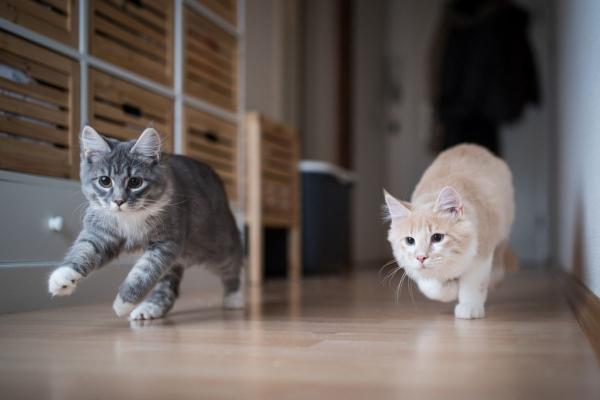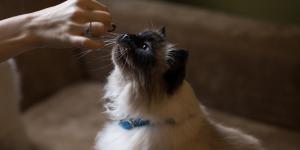My Cat Steals Food From My Other Cat



See files for Cats
If you have two or more cats, it is not always easy to get them to share. Even if you share the food evenly, you may find one cat gets greedy and eats the food of another cat in the home. Since cats oftenself-regulate how much they eat, this can become a tricky problem and you don't want to end up with one cat having too much and one too little.
In this AnimalWised article we explain why your cat steals your other cat's food. We understand the reasons for this behavior, the risks it poses to both cats and what we can do to prevent it from happening in the future.
Why does my cat steal the other cat's food?
Just like we humans, cats have their own individual approach to their food. In general, however, they prefer to eat quietly and without company. For this reason where we place their food and water dishes is important. It needs to be somewhere secluded and away from any traffic we have in the home. Very importantly, it needs to be in a separate area from the litter box.
This need for privacy when eating is made more difficult when there are more than one felines in the home. One cat eating another's food is a fairly common practice, even if the cats otherwise get along. This is why we should look at the reasons why a cat will steal another's food:
- Nutritional needs: we may think we can simply give each cat the same amount and type of food. However, what a cat eats will depend on the individual. The main factors to consider are their size, age and health status. A large young cat will generally eat more than an older small cat. This may be why one cat is stealing food from the other; because their basic nutritional needs are not met.
- Preference: cats have their own personal taste when it comes to quality and flavor. It is possible one cat prefers the other's type of food and will eat it simply because they prefer it. If we need to give one cat a certain diet for whatever reason, the other cat might find it tastier than their normal food.
- Health and disease: an increased appetite can be a symptom of certain cat diseases. For this reason, the cat may eat the other cat's food because a certain pathology is making them feel the need to eat more. Intestinal parasite infestation and other gastrointestinal problems are the most likely cause. However, if a cat suffers from obesity, there may be other reasons such as a hormone imbalance.
- Stress and insecurity: we provide for our cat's basic needs, but if there is a reason they feel like their needs won't be met, they can become stressed and insecure. Maybe you have brought a new cat into the home and the other cat feels they are not getting enough attention. This can cause them to feel anxious and they eat the other cat's food because they fear they will lose out. Look at the possible reasons why your cat is stressed and see if any apply in this situation.
- Social interaction: if your cats are not stressed and are otherwise healthy, there may be an issue of hierarchy. In cat colonies, felines have certain ranks and roles which vary according to many factors. If one cat is eating the food of another, it may be a territorial issue or simply a need to show who is boss, something which can be seen when a new cat enters the home.
- Cats don't get along: unfortunately, cats have different personalities and they sometimes will not get along. This can be due to many reasons, poor socialization being one of the most important. Sometimes it is simply not easy to tell why one cat has a problem with another, but the eating of their food might be a clear signal they are not getting along. Some cats simply do not get along with other cats.
Although there is a hierarchy between cats, when both enjoy enough food they do not feel the need to compete with each other for this resource. If we don't meet the basic needs of all the cats in a home, it is going to lead to more problems.
How to stop a cat eating another cat's food
Whether your cat eats another cat's food because they steal it or the other leaves it, it is bad for any cat to eat too much or too little. Cats are animals of routine, so it is important we establish a feeding regimen from the beginning. This can help us to avoid over-eating and to ensure each cat gets the nutrients they need. The result will be all cats in the home being happy and healthy.
If you are wondering about how cats get along, you can check out our video on how many cats you can keep in one home:

Establish a routine and separate resources
The first thing we need to know is that cats prefer to eat several times a day. This is why you will need to determine the total amount each cat will need to eat in a 24 hour period and portion it throughout the day. Our article on how much you should feed a cat each day.
Once the amount of food a cat needs has been determined according to age, size and health, it is best to set a schedule. Not only do cats need to eat throughout the day, they need to know when they will eat. If not, they can feel like they are not going to be fed and become anxious. It is one of the reasons cats meow at their guardians a lot. Each cat will need their own bowl and they should know which one is theirs. You can set them in the same room, but it is best to separate the area in which the bowl is placed so the cat can better understand what belongs to whom.
While they eat, observe them from a distance to check their relationship. Most importantly, we can better see the cause of why the cat is stealing food. For example, if the cat does not eat their own food, but goes straight to the other cat's bowl, it implies the problem is with their relationship, not the feeding schedule.
See if you can give them both the same food
If the reason why your cat steals another cat's food is because they prefer it, think about giving them the same food. Some cats may need homemade food or carefully tailored food because they are required to eat healthily. The other cat may find homemade food tastier, so you should provide them with the same kind.
There may be cases where a cat is unable to eat the same food because it will negatively affect them. However, this is in the minority of cases. More often, if one cat needs a hypoallergenic diet, grain-free feed or some other special diet, then the other cat may be able to eat these without having their health negatively impacted.
Feed them in separate rooms
When two cats simply do not get along, you may need to separate them. It is not ideal as it is much more preferable to have the cats get along together. Unfortunately, some cats will need to find peace in another room. In these cases, you can still set the same feeding schedule, but you can simply place the food bowls in another room when it comes time to eat. You can even close the doors, if necessary.
However, if there is a hierarchy issue, it is best to feed the cat with the higher social rank first. This way, they will not feel as inclined to steal from the other.
Use a programmable feeder
Finally, we might be able to let technology find a solution. On the market today are programmable electronic feeders. These use a chip which is located in the cat's collar which makes food be released when the cat approaches. This is not an option available to everybody and it is still possible the other cat will come over to fight for the food when this happens, but it might be a suitable resolution in some cases. It is especially helpful for cats on a special diet.

What happens if an adult cat eats kitten food?
The difference between kitten food and adult cat food is the percentage of protein, fat and carbohydrates they contain. For example, kitten food contains more fat as they need it for their still developing bodies. If you give an adult cat kitten food, it is likely they will become overweight since their metabolism will not be as fast. They will also have less energy to burn off the fat.
If an adult cat and kitten live together in the same home, it is important you feed them both well. The higher fat content can make kitten food seem more appealing, especially if the kitten eats wet food and the adult cat doesn't. You may need to separate their feedings and make other arrangements above, but this should last until approximately 12 months. After this time, both cats should be able to eat the same type of food, hopefully preventing either stealing from the other.
If you want to read similar articles to My Cat Steals Food From My Other Cat, we recommend you visit our Behavioral problems category.






